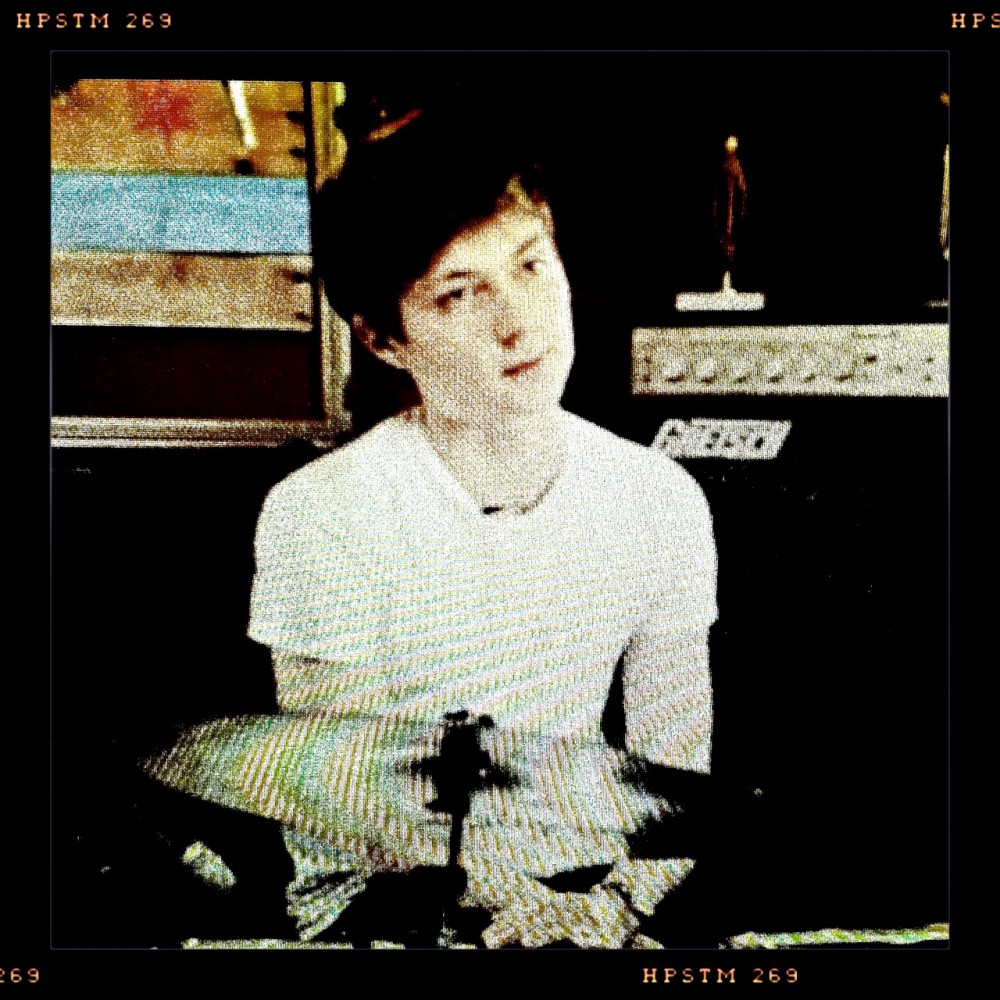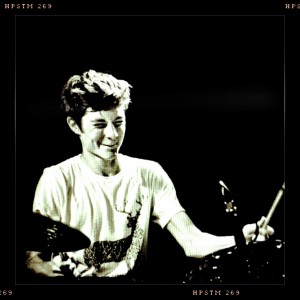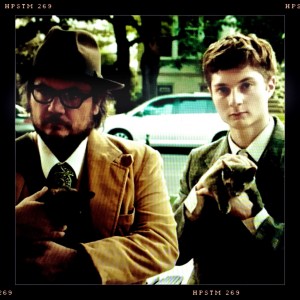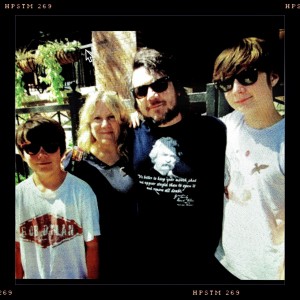
21 Mar Spencer Tweedy – The Interview
On one hand, Spencer Tweedy likely requires little in the way of introduction. If you know of his father, Jeff, and his work you probably have a pretty good idea of where Spencer is coming from, aesthetically speaking. He lives in Chicago, turned 19 in December of last year, and is currently on tour with his dad and their band, Tweedy, in support of their album Sukierae which was released in September.
On the other hand, considering Spencer merely as adjunct to his father and his father’s career does not, of course, give him the credit he very much deserves. Spencer is much more than Jeff Tweedy’s son, cool though that may be. He is a very thoughtful and articulate young man whose precocity you can sample at his blog where he posts photographs, essays, video clips and music. (Sounds somewhat familiar… but despite his youthful years he’s been at it for quite a while longer than Your Humble Narrator.) In addition to Tweedy, the band, Spencer has a variety of other musical involvements and I can assure you that they are definitely well worth a listen. His album with the Blisters, Finally Bored, resides very happily on YHN’s iPod and the song Own It by the Raccoonists (Jeff + Spencer + younger brother Sammy) enjoys steady rotation on the DJ Inky playlist.
Having been a fan of assorted Tweedys lo these many years I jumped at the opportunity to write a bit about the family band’s forthcoming concert in Santa Fe (March 26th at the esteemed Lensic Performing Arts Center), with the condition that I could interview Jeff or Spencer. Spencer graciously set aside some time for me on a frigid Monday morning in February and the complete transcript of our conversation can be found below.
One thing I did not get around to talking with Spencer about is how he deals with the perception—almost inevitable, I expect— that he must enjoy an unfair advantage in life just by being who he is. Upon this flimsy basis, some people will inevitably resent or dismiss him out of hand without any regard for what he actually does or says. Being the offspring of a notable person can be both a blessing and a curse and it can weigh heavy on those who are not psychologically equipped to shoulder the burden. Having followed Mr. Tweedy the Younger via his blog, his music and his interviews and now having spoken with him, my impression is that his parents have done a fine job of prepping him with the tools necessary for dealing with acclaim and attention, whether direct or reflected.
So those are my thoughts, and now here is the Spencer Tweedy interview, in its splendid entirety. A very trimmed down version appeared in the Santa Fe New Mexican’s Friday arts supplement, Pasatiempo, on March 20th.
I encourage you to pay attention to this young man. He is off to an excellent start and will most certainly continue to produce good things. And I should mention that the kid happens to be a pretty damn fine drummer too.
The Interview
Your Humble Narrator – Hi Spencer, how are you?
Spencer Tweedy – Hi, I’m good. How are you?
YHN – I’m very well, thanks. How’s things in Chicago today?
ST – It’s good. Still pretty brutally cold here though.
YHN – Yeah, it’s pretty chilly here too. I’ve been waiting for it to snow today but so far I’ve been disappointed. Anyway, as you know, I’m writing an advance article for the arts supplement in the local newspaper regarding your show coming up next month at the Lensic.
So, you’re, what, 19 years old now?
ST – Yeah. Nineteen.
YHN – I’ve been reading your blog (spencertweedy.com) off and on for the last few years and I’ve got to say, it’s pretty great. If, when I was your age, there were things like the internet and social media and digital recording I can’t imagine what sorts of things I might have come up with.You put out an awful lot in terms of thoughtful writing, music, photographs—what are your thoughts about all the technology that exists today to get it all out there?
ST – It’s amazing. I feel really grateful. Growing up and listening to music, mostly music that’s not from this—my—generation, I think there are times when kids are tempted to say ‘I wish I was born in the ‘50s or the ‘40s so I could have been a young adult in the ‘60s’ or things like that. There’s definitely something romantic about that but it’s a really awesome time to be alive, especially for kids who need an outlet for something creative. It was really great for me when I was going to school to have a creative outlet outside of that. It’s really healthy I think. It can keep you sane.
YHN – When I was a kid it was just pens and pencils and notebooks and stuff like that, which is great too, but there was always a desire to put things out there and let other people see it, get some sort of feedback, and that was really difficult. The infrastructure didn’t really exist back then. It’s amazing how many tools are available now.
ST – It’s incredible.
YHN – Were you one of those kids who was always beating on things, in terms of your interest in drumming?
ST – Absolutely. I was always a good student but the thing I got in trouble for most often was just annoying the crap out of my teachers by playing drums on every surface in the entire classroom. And that continued on, growing into an adult, and I’ve had to curb that a little bit. Even in high school I was getting on the nerves of some of my teachers because it’s so much fun, playing drums even when you don’t have a drum set in front of you.
YHN – It’s pretty amazing how much expression you can get out of just a table top when you’re doing that.
ST – Yeah, I think that when you’re doing that you’re still exercising your brain to play drums which is more important in a lot of ways than exercising your arms or parts of your body. I also got in trouble a lot for humming and singing songs. I made up a lot of gibberish songs when I was younger. That annoyed a lot of people.
YHN – You had this group, and, well, you may still have this group, the Blisters. Are the Blisters still a going concern? Are they going to pick up again after the Tweedy tour is over?
ST – The state of the Blisters is that we still exist and we get together and play music whenever everyone is back home in Chicago. Half of our members have been away at school and I’ve been really busy on the road with my dad. When everybody’s available we get together and play a couple of shows or work on new songs. So we’re just sort of playing it by ear. I’m not exactly sure what this year holds for us. Everybody in the band has tons of other projects going on. Our bass player just put out a solo record. Or lead singer/songwriter who has written all the songs has put out a couple of solo records and is working on some more. We’re still active and even when we’re not playing shows and stuff we’re still friends.
YHN – You’ve written and recorded some of your own songs which I’ve listened to online—Temple State and Rushmore. How much songwriting are you getting into these days? All the songs on the Tweedy record were written by your dad, but is songwriting part of what you’re aspiring to?
ST – Yeah. It’s a weird thing because being a drummer my whole life and that being the focus of the music I’ve played since I was a really little kid, it seems a little weird calling myself a guitar player or a songwriter or a singer. But I have been doing a ton of that lately. I’ve been putting together a studio at home and I’ve been recording as much as I can when we’re off the road. I’ve been working on a lot of material but I don’t know when it’ll come to fruition or be released but that’s something that I definitely want to do sometime soon.
YHN – I grew up in New Orleans (although my mom was from Chicago) and my dad was an artist—a painter. Your dad is musician and a rock star. When you grow up with that, in that milieu, it doesn’t seem at all unusual. It’s just your normal, regardless of how exotic or unusual it might seem to someone else.
ST – Yeah! And my other ‘normal’ was going to a Montessori elementary school growing up and having the parents that I have. Creativity was encouraged and looked at as a necessity of life, not just as an allowance after you put your work in. I think that was pretty formative as well.
YHN – Are you actually a Wilco fan?
ST – Absolutely. I am 100% a fan. It’s complex and a lot of people think it’s weird but I love Wilco records. I am a massive fan.
YHN – Well, that makes two of us. You did that video for Low Key which I thought was great. In it the record company is portrayed as this group of hostile assholes sitting in an office headed up by a malevolent gorilla obsessed with bananas. Your dad’s past wrangling with record companies is well documented—has that antipathy with the business end of things carried over into the next generation?
ST – Actually, for us the gag of that video, of that thought line, was that Wilco is their own record label now. They have their dBpm imprint, so we decided it would be funny to poke fun at it. It’s become sort of a cliché trope to vilify major labels, which in a lot of cases are really immoral, run by really greedy people, but we just thought it would be funny to put a twist on that and have it be ironic because they are their own bosses these days.
YHN – It’s an excellent record. I was listening to it on a plane recently, with headphones, which is great for really just focusing on the music, and it’s full of really subtle, low key songs, some very minimal. And then there’s this perfect gem of a pop song [Low Key], with the girls ‘ooh’-ing and ‘aah’-ing in background. The album credits your dad with ‘iPhone tracks’ on some of the songs. Was he doing a GarageBand thing on his phone?
ST – No, it was sort the same way that you’d use a cassette recorder to make a memo of a song idea. He uses the voice memo zapper, another recording app, just to record song ideas just on acoustic guitar and sometimes when we’re listening back to the idea it’s like ‘Well, that’s steady enough… that sounds good, let’s play drums to that.’ So those recordings wormed their way into a few tracks, which I think is kind of unique.
YHN – I read your essay on The Art of Waiting that was in Rookie a while back. That was, what, like a year-and-half ago? Not quite two years? Have you thus far avoided becoming jaded? Do you still have the optimism that you talk about in the essay?
ST – Yeah. I mean, I think the deal with things like that is that I don’t know if I would really be able to tell because I think that I might be less optimistic than I was, but I still feel good, I still feel optimistic. It’s hard to see yourself in that way. It’s hard to look outside of yourself and measure things like that. But my worst fears have not come to pass.
YHN – Good! I’m glad to hear it. When I think about what you’re doing now—going out on the road in an actual professional touring situation, as opposed to riding around with a bunch of smelly guys in the back of a van, which is kinda great, too, in its way—it must be really fantastic to do this in these great venues. It must be amazingly great.
ST – Oh it is. The cool parts are sort of endless. You mentioned the theaters we play—most of the venues are theaters and a lot of the time, like in the U.S., which is a fairly young country, those are like the oldest buildings in town. Those are really cool. They’re just a million things that make it really valuable.
YHN – I think it’s pretty typical for any kid growing up that at some point, no matter who their parents are, begin to think that their parents are sort of boring and embarrassing. Like President Obama’s daughters were caught on camera rolling their eyes at some event with their dad, and he’s the president! Have you gone through that stage or have you managed to avoid it entirely. Your parents seem like pretty cool people.
ST – Uhhh, I dunno… I don’t think of either of my parents as being boring. It’s a weird thing because I’ve been aware of it for a long time from watching movies and watching TV shows and seeing it in media, like, the parents that were once cool, like a Judd Apatow movie where Paul Rudd is chained down these days and not fun anymore. Or trying to still be fun even though he has kids. I’ve always felt like my family is a little bit special. My mom is really really cool. All my friends think she’s cool—she used to run a rock club, after all. And my dad obviously has the quote/unquote ‘rock star’ benefit. I don’t know, they haven’t really changed to me. I’ve always thought that both of them were funny. If anything in my perception of my parents has changed, it’s that I realize now just how less omniscient they are. When I was a little kid I thought, ‘Oh my God! My parents know everything! They think of everything’ you know. Now I realize they’re a little more human in that sense. I don’t think that they’re lame, and seriously, thank God for that, because it’s one of the more depressing things that can happen.
YHN – On the theme of movies, did you see Boyhood?
ST – Yeah! It’s so crazy how that Wilco song Hate It Here was in that scene in the car, that it was contemporary when they filmed it.
YHN – What did you think of the film, relative to someone who’s about the same age as the boy, Mason, is at the end of the movie? Did it speak to you in any particular way?
ST – Uhhh… well… no (laughter). I think it’s a really really beautiful movie but for me, I didn’t feel like that character’s monologues were representative of thoughts going through my head at that age, or at this age. I dunno… I thought it was rather painfully melodramatic and naive, and I feel like an asshole (laughter) or pretentious for talking about it like I’m somehow above it. For me… it might be realistic in some ways but it didn’t really reach me like that.
YHN – Did you watch the Oscars last night?
ST – No. But we had an opportunity to be nominated and it ended up falling through.
YHN – For that movie?
ST – Yeah, for the song in Boyhood.
YHN – For the song playing in the car, Hate It Here?
ST – Oh, no—I’m talking about the Tweedy song. You might have missed it because it actually plays under the credits. It turns out the song wasn’t eligible because it had to be over a certain time limit in the film or something. He [Mason] plays it in the scene in his dorm room but it’s too quiet and too short.
YHN – Is the Tweedy group that you’re touring with in March the same that you’ve been with—the group that was on Austin City Limits? Same group of people?
ST – Yep. Except the Lucius girls don’t go on the road with us. They just join up whenever they can, whenever it’s convenient.
YHN – Have you ever been in New Mexico before?
ST – Yeah. I’ve been to Albuquerque and Santa Fe. It’s really cool.
YHN – The venue that you’re going to be playing in is great. It’s not the oldest building town—Santa Fe is a really old town—but it’s a beautiful old movie palace. Great sound, should be fantastic. I’m really looking forward to it.
ST – Cool!
YHN – How’s your mom doing? Has her situation gotten better? I know she’s been dealing with some health issues.
ST – Yeah, she is doing very well, about as well as we could hope, given the circumstance. She’s about to finish up radiation, actually this week, and from here on out it’s going to be periodic maintenance. She had two cancer diagnoses and one of them is officially in remission and the other was removed so I guess it’s in remission too and we’re really happy about that.
YHN – Well congratulations and my thoughts are with you on that.
ST – Thank you.
YHN – What’s the outlook for college? Do you have any specific schools in mind or is that still on the back burner?
ST – I’m enrolled in a school, in a liberal arts school, and I’m going to go there this fall, because if I don’t my mom will, uh, murder me (laughter). But I’m also looking forward to it. I do pretty well in school and there are parts of the academic environment that really work for me and I at least have to experience a little bit of college. That’s what I’ll be doing in the fall.
YHN – Great. Well, I wish you the best of luck and I’m looking forward to the concert. Like yourself, I’m an aspiring photographer and I just did a book. If I have a chance to see you at the gig I will give you a copy.
ST – Oh, awesome! That’s great!
YHN – It’s suitable for coffee tables if you have a very small coffee table.
ST – Well tour buses are pretty cramped so it’ll sit just fine on the coffee table there (laughter).
YHN – Right across the street, sort of catty-cornered from the venue, is this bar called the Matador Lounge and I DJ there on Thursday nights. I wish you could come, but I’m afraid you’re not old enough! If you could come I’d put down a special set for you.
ST – Thank you. Jim (Elkington – guitar) and Liam (Cunningham – keyboards) usually go out to a bar afterwards so maybe I could mention it to them and they could go in my place.
YHN – Anything else you can think of? Anything on your mind?
ST – No. I think we’ve covered pretty much all the ground there.
YHN – Great. It’s been a pleasure. I look forward to the show and perhaps meeting you in person.
ST – Thank you.
YHN – All my best to you and your family and have a great tour.
ST – Awesome. Thank you so much.



